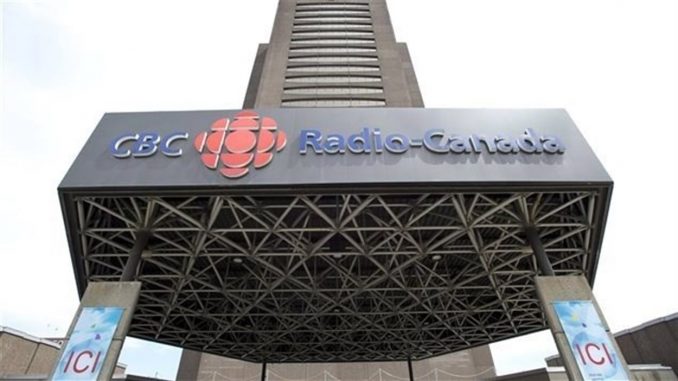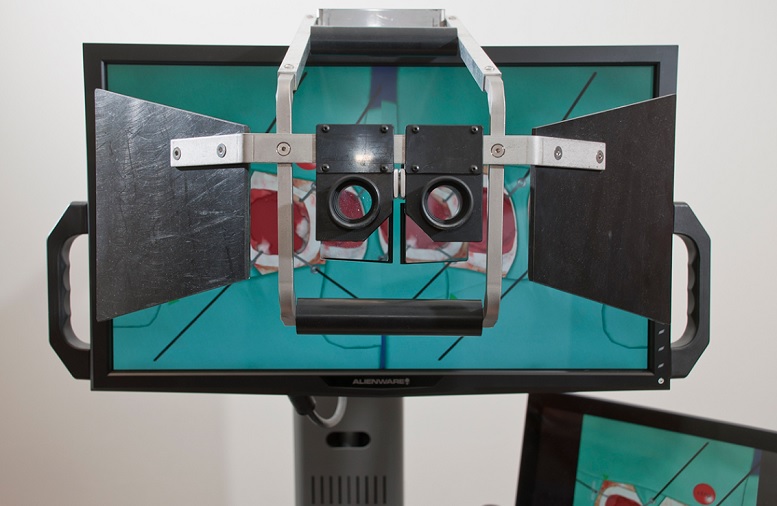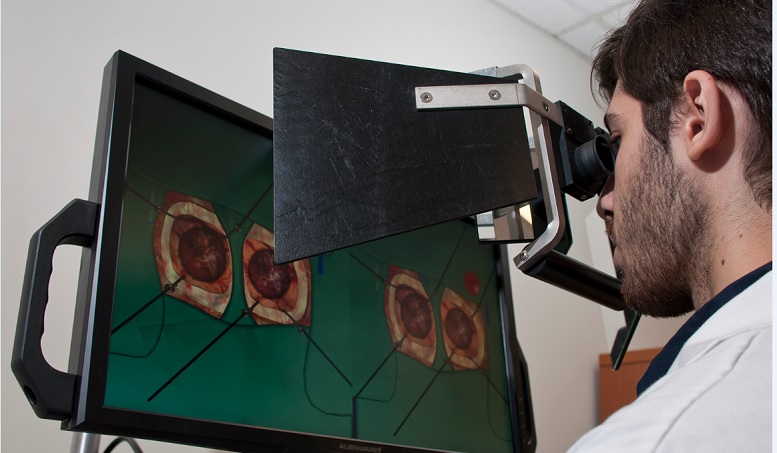

Dr Ronaldo Del Maestro (MD, PhD, FRCS(C), FACS,DABNS) has been working for ten years with experts in many fields in the development of a world leading surgical simulator (supplied)
By Marc Montgomery |
english@rcinet.ca
Posted: Wednesday, August 7, 2019 13:3
It’s a technology that is revolutionising surgical training.
When a surgeon starts to work on you, you’d like them to be experienced. Typically though that comes with practice. Now as in the airline industry, that practice and dealing with unexpected emergencies can take place “virtually” in a simulator so the surgeon gains experience before arriving in the operating room.
Ten years of development involving experts from a wide variety of fields and with the National Research Council of Canada, has led to a surgical simulator that is greatly helping to train the next generation of neuro-surgeons. But it also has wider implications in other surgical and even dental training. The Canadian developed technology is called NeuroVR
Dr. Rolando Del Maestro, (MD, PhD, FRCS(C), FACS,DABNS) has been involved in the development since the beginning, He is the Director, Neurosurgical Simulation and Artificial Intelligence Learning Centre at the Montreal Neurological Institute and Hospital, McGill University in Montreal.
R. Del Maestro of Montreal talks about a Canadian developed surgical simulator involving VR and AI is considered a world leader in surgical simulation
The technology means that neuro-surgeons will be highly skilled and expert before they begin leading delicate brain surgery in the operating theatre.
In assessing the new technology, a trial was conducted involving four levels of neurological staff; from neurosurgeons, to fellows and senior resident surgeons, junior resident surgeons, and medical students.

The technology provides virtual reality feedback to the surgeon/student during brain operations and can create unexpected emergencies, as in a flight simulator, so the student has experience should an emergency occur during a real operation. (Learning Centre-The Neuro-McGill
The research was published last week in the Journal of the American Medical Association (JAMA) under the title, “Machine Learning Identification of Surgical and Operative Factors Associated With Surgical Expertise in Virtual Reality Simulation”
An additional commentary was also published by JAMA last week under the title, “Artificial Intelligence and Training Physicians to Perform Technical Procedures”
The new NeuroVR technology accurately simulates a brain operation along with all the surgeon’s actions, from positioning of instruments, forces and pressures applied, bi-manual expertise (left and right hands), and outcomes such as the amount of tumour removed and blood loss. The fusion of artificial intelligence (AI) and virtual reality (VR) in the neurosurgical simulators can accurately and efficiently assess the performance of surgeon trainees and guides them through the complex procedures noting areas which need more improvement before they operate on real people.

The technology asseses every move the surgeon makes, including tool positioning, pressures, dexterity, compared to those of an expert performing the same operation. It offers corrections when needed so the student perfects their skills, before working on human patients. (Learning Centre- the Neuro-McGill)
As mentoring surgeons commitments are divided between their own patients needs and teaching, the new technology frees up some of that instruction time to enable more time for the surgeon’s own patients. Quoted in a news release Dr. Del Maestro says, “. “Our study proves that we can design systems that deliver on-demand surgical assessments at the convenience of the learner and with less input from instructors. It may also lead to better patient safety by reducing the chance for human error both while assessing surgeons and in the operating room.”
Canada Russia, France, Italy, China have now also purchased this Canadian technology.
Dr del Maestro says Olympic training expertise and bio-feedback is also being added to the technology in terms of improving bi-manual skill and physical control as it has been shown that surgeons in delicate operations experience great stress and have the same EEG patterns as athletes in Olympic competition.
Dr del Maestro says the technology is adaptable to all kinds of other medical and dental training and even other fields where bi-manual dexterity in needed.
While this is already considered world-leading technology, he says work is already continuing on the NeuroVR to develop its abilities even further.
Funding for this research for this study was provided by Franco Di Giovanni Foundation, the Montreal English School Board, the McGill Department of Orthopedics, the Fonds de recherche du Québec – Santé (FRQS), and a Robert Maudsley Fellowship for Studies in Medical Education from the Royal College of Physicians and Surgeons of Canada.
https://www.rcinet.ca/en/2019/08/07/training-brain-surgeons-with-vr-and-ai/
